Refugee Week at Keele will open officially on 16th June with a wine reception in the Claus Moser building at 5.30 pm. The launch aims to gather together senior representatives of the university, academic staff, students, as well as members of the community to celebrate the history, the present and the future of refugees in the UK. This opening event will also feature a 15 minutes music performance by Dr Kelcey Swain (Bristol); for this occasion Kelcey has composed an electroacoustic piece which aims to conjure up ideas of displacement , uprooting, dislocation, yearning to belong. Music and images brought to Keele University for Refugee Week will engage the audience in contemporary refugee matters and will also offer alternative portrayals of migrants – not just victims, but actively involved in shaping their future. Come along, spread the word, and join us for Refugee Week at Keele!
Organising committee: Rachel Bright, Siobhan Holohan, Mariangela Palladino, Ala Sirriyeh.
For further information, please contact one of the organisers by email: r.bright@keele.ac.uk; s.holohan@keele.ac.uk; m.palladino@keele.ac.uk; a.sirriyeh@keele.ac.uk
More happening for Keele Refugee Week:
Keele University Creative Writing Students and the KPA (Keele
Postgraduate Association) will host
Open mic poetry and music on seeking sanctuary and human
displacement. This will take place at the KPA, Keele
University Campus, on 9th June at
6pm. Contact Patrick Atack: v6p67@students.keele.ac.uk
(https://www.facebook.com/Keelepostgrads)

.JPG)



